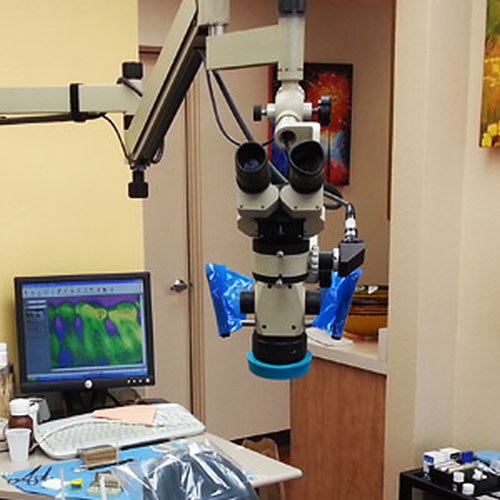Dr. Mehta was raised in Toronto, Canada and received his Bachelors of Science degree with honors in Life Sciences, a program directed at the pre-medical and pre-dental sciences, from Queen’s University. Dr. Mehta then continued his education by pursuing a four year Doctorate degree in Medical Dentistry (D.M.D.) from the University of Pennsylvania. Due to his high academic achievement, Dr. Mehta was then accepted into the post-doctoral program at Boston University – a program revered for its reputation in training the highest level of academically oriented clinician.
Under the tutelage of Dr. Herbert Schilder, considered by many to be one of the modern-day fathers of Endodontics, and Dr. Jeffrey Hutter, a past-president of the American Association of Endodontists, Dr. Mehta also completed a three-year Master of Science in Dentistry. This Master’s degree was directed at learning the microbiological, physiological, and biochemical processes behind inflammation, a critical component involved in Endodontics.
Dr. Mehta’s research was subsequently published in Infection & Immunity in 2002.
Dr. Mehta is an active member of the American Association of Endodontists, California Association of Endodontists, American Dental Association, California Dental Association and Orange County Dental Society. He has been in private practice in the field of Endodontics since 1999.
ROOT CANAL PROCEDURE:
The root canal system inside your tooth has been thoroughly cleaned, and the irritated tissue and bacteria that have caused you to need root canal treatment are gone.
It is normal to feel some tenderness in the area over the next few days as your body undergoes the natural healing process. You may also feel some tenderness in your jaw from keeping it open for 30-45 minutes. These symptoms are temporary and usually respond very well to over-the-counter pain medications. It is important for you to follow the instructions on how to take these medications. Remember that narcotic medications, if prescribed, may make you drowsy, and caution should be exercised in operating dangerous machinery or driving a car after taking them.
Your tooth may continue to feel slightly different from your other teeth for some time after your root canal treatment has been completed. However, if you have pain or pressure that lasts more than a few weeks
Your tooth and surrounding gum tissue may be slightly tender for several days as a result of manipulation during treatment and previous condition of your tooth. This tenderness is normal and is no cause for alarm. Do not chew food on the affected side until your endodontic therapy is completed and your tooth is covered with a protective restoration provided by your restorative dentist. You may continue your regular dental hygiene regimen. Discomfort may be alleviated by taking ibuprofen (Advil), aspirin, or acetaminophen (Tylenol) as directed.
NOTE: Should you experience discomfort that cannot be controlled with the above listed medications, or should swelling develop, please contact our office.
The office telephone is answered day and night. If you need to call after hours, please have your pharmacy number available.
If you have any questions, please call our office at 714-838-1238.
GUIDELINES FOR POST-TREATMENT CARE
- Do not eat anything until the numbness in your mouth wears off. This will prevent you from biting your cheek or tongue.
- Do not chew or bite on the treated tooth until you have had it restored by your dentist.
- Be sure to brush and floss your teeth as you normally would.
- If the opening in your tooth was restored with a temporary filling material, it is not unusual for a thin layer to wear off in-between appointments. However, if you think the entire filling has come out, contact our office.
- Contact our office right away if you develop any of the following:
- a visible swelling inside or outside of your mouth;
- an allergic reaction to medication, including rash, hives or itching (nausea is not an allergic reaction);
- a return of original symptoms; or
- your bite feels uneven
AFTER TOOTH EXTRACTION
After tooth extraction, it’s important for a blood clot to form to stop the bleeding and begin the healing process. That’s why we ask you to bite on a gauze pad for 30-45 minutes after the appointment. If the bleeding or oozing still persists, place another gauze pad and bite firmly for another 30 minutes. You may have to do this several times.
After the blood clot forms, it is important not to disturb or dislodge the clot as it aids healing. Do not rinse vigorously, suck on straws, smoke, drink alcohol or brush teeth next to the extraction site for 72 hours. These activities will dislodge or dissolve the clot and retard the healing process. Limit vigorous exercise for the next 24 hours as this will increase blood pressure and may cause more bleeding from the extraction site.
After the tooth is extracted you may feel some pain and experience some swelling. An ice pack or an unopened bag of frozen peas or corn applied to the area will keep swelling to a minimum. Take pain medications as prescribed. The swelling usually subsides after 48 hours.
Use the pain medication as directed. Call the office at 714-838-1238 if the medication doesn’t seem to be working. If antibiotics are prescribed, continue to take them for the indicated length of time, even if signs and symptoms of infection are gone. Drink lots of fluid and eat nutritious soft food on the day of the extraction. You can eat normally as soon as you are comfortable.
It is important to resume your normal dental routine after 24 hours. This should include brushing and flossing your teeth at least once a day. This will speed healing and help keep your mouth fresh and clean.





